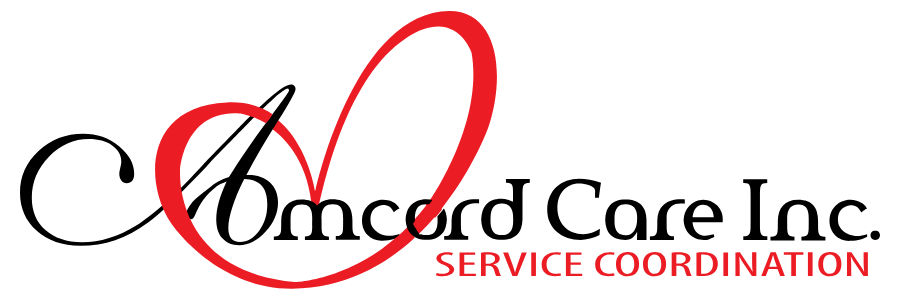4. Terminology, Abbreviations, and Definitions
MCO – Managed Care Organization – A health care delivery system organized to manage cost, utilization, and quality of insurance while improving the quality of the care. Example: PA Health & Wellness.
HCBS – Home and Community Based Services – A type of Medicaid waiver to deliver person-centered care in the home and community of the participant.
SCE – Service Coordination Entity – Provider of Service Coordination. Example: Amcord Care, Inc.
SC – Service Coordination or Service Coordinator – Someone employed under an SCE to manage services for participants.
DME – Durable Medical Equipment – Non-disposable medical equipment used in the home to better assist with quality of life. Examples: Cane, walker, wheelchair, recliner, hoyer lift, scooter, hospital bed, commode.
SME – Specialized Medical Equipment – Supplies or items that provide direct medical or remedial benefit to a participant related to their disabilities.
PAS – Personal Assistance Services – Service that provides hands on assistance (usually in the form of a Caregiver or Direct Care worker) to participant to help them integrate more fully into the community and ensure the health, welfare, and safety of the participant.
PERS – Personal Emergency Response System – An electronic device connected to a person‘s phone and programmed to signal a response center when the “help” button is activated. Example: Life Alert Device (‘help, I’ve fallen and I can’t get up!’).
ADC/ADP – Adult Day Care/Program – A non-residential facility designed to assist Participants in meeting, at a minimum, personal care, social, nutritional and therapeutic needs.
HDM – Home Delivered Meals – Pre-made packaged meals delivered to a person’s residence to improve nutrition and maintain dietary restrictions.
NMT – Non-Medical Transportation – Transportation through local services to and from social and medical appointment.
TC – Telecare – Social and healthcare services supported by innovative technologies to sustain and promote independence, quality of life and reduce the need for nursing home placement.
NPO – New Participant Orientation – An in-home visit completed with participants to initiate a care plan for participant’s who are new to the Waiver program, lost eligibility for over 60 days, or new to PHW.
MTC – Monthly Telephonic Contact – A call conducted, each month, with a participant and/or legal representative to review care plan and ensure all information is up to date.
MCA – Member Contact Assessment – An assessment completed from Envolve to document the discussion (or unsuccessful outreach) with a participant and/or legal representative. Completed each time a call or visit is done with a participant or their legal representative.
SRT – Service Request Tool – A document completed (by Supervisor) when requesting new services or increases, reductions, or terminations of previous services.
PCSP – Person Centered Service Plan – A detailed assessment about the participant’s care plan and services.
HRA/DSNP – Health Risk Assessment/Dual eligible Special Needs Plan – A document from Envolve to assess the special needs of the participant to coordinate appropriate services for them.
POHO – Proof of Home Ownership – Documents which verify ownership of a residence. Includes: Mortgage Statements, Annual Property Tax Statements, Warranty Deeds.
PCP – Primary Care Physician – A physician that provides regular generalized care for all types diagnoses and physical health.
NPI – National Provider Identifier – A unique 10-digit identification number issued to health care providers in the United States by the Centers for Medicare and Medicaid Services. (ex. Amcord’s is 1659828887).
CG/DCW – Caregiver/Direct Care Worker – A person that is paid to provide day to day care and assist with ADLs and IADLs.
POA – Power of Attorney – A legally appointed person with authorization to represent or act on another’s behalf in private affairs, business, or some other legal matter.
ADL – Activities of Daily Living – Daily tasks necessary to remain healthy. If not performed it would result in immediate risk to the individual’s health and/or safety. Examples include bathing, personal hygiene, dressing, walking, locomotion, transferring, toilet use, bed mobility, and eating.
IADL – Instrumental Activities of Daily Living – Tasks necessary to live in the world. If not performed it would result in risk to an individual’s ability to live independently. Examples include Meal Preparation, Housework, Managing Finances or Medications, Phone use, Stairs, Shopping, and Transportation.
Formal Support – Someone who is paid to provide care to the participant, including staff from providers, family members that are being paid as caregivers (during the scheduled times they are actually being paid to provide a service), etc.
Informal Support – Someone who provides care when not being paid, including family, friends, neighbors, community members, etc.
PHW – Pennsylvania Health & Wellness – An MCO under the CHC Waiver (It’s the one Amcord has a contract with).
DHS – Department of Human Services – Administers/manages services for improving quality of life for PA’s residents and their families.
OLTL – Office of Long Term Living – An office branch of the DHS that manages the Long Term Care System and provides independent living resources for the elderly and/or disabled that qualify.
IEB – Independent Enrollment Broker – Assists/manages participant’s enrollment in OLTL services by: Determining eligibility for enrollment, Educating participants on various programs, Selecting a Service Coordinator (depending on choice of program).
LTSS – Long Term Services and Supports – The services and supports provided through OLTL programs. Also known as Long Term Care.
CHC – Community Health Choices – A prominent waiver program under OLTL for HCBS.
Ptp – Participant – The individual enrolled in the waiver program(s) and requiring care.


